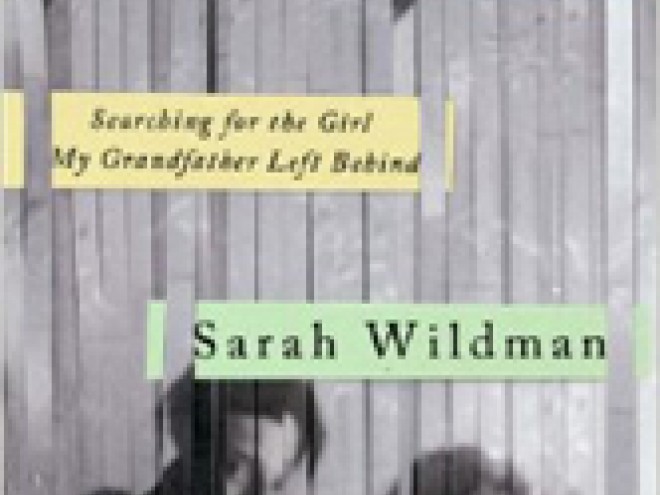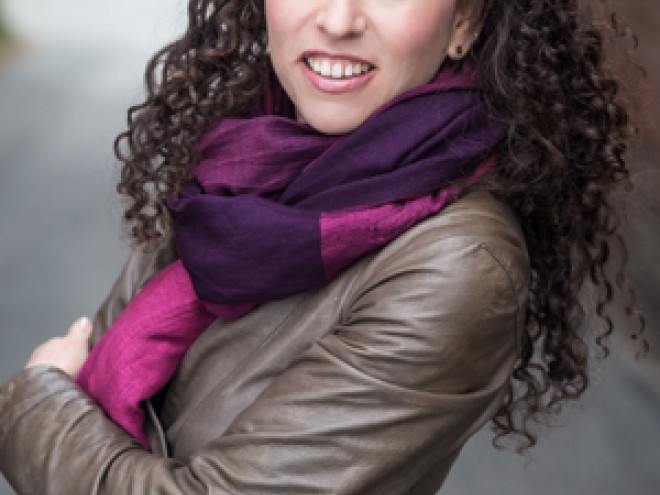Earlier this week, Sarah Wildman shared a short reading list and an interesting letter that didn’t make it into her book, Paper Love: Searching for the Girl My Grandfather Left Behind. She has been blogging here all week for Jewish Book Council’sVisiting Scribe series.
 I’m a little bit obsessed with letters and the way we all once lived – pen or typewriter to paper, considered missives that were sent off to our loved ones, without hope of a reply in seconds or minutes, but with a wait that spanned a day or days or weeks or months. In shoeboxes at my parents’ house I have my own collections of love stories, friendships, conversations that didn’t take place electronically. But of course, as a teen, we had the phone, which we would hold on to, for hours on end, even “long distance,” which reduced the number of letters sent, if one wasn’t ‘away,’ say, or specifically feeling romantic, nostalgic, or hard to reach.
I’m a little bit obsessed with letters and the way we all once lived – pen or typewriter to paper, considered missives that were sent off to our loved ones, without hope of a reply in seconds or minutes, but with a wait that spanned a day or days or weeks or months. In shoeboxes at my parents’ house I have my own collections of love stories, friendships, conversations that didn’t take place electronically. But of course, as a teen, we had the phone, which we would hold on to, for hours on end, even “long distance,” which reduced the number of letters sent, if one wasn’t ‘away,’ say, or specifically feeling romantic, nostalgic, or hard to reach.
In my grandparents’ era, with mail that arrived twice daily, the news was nearly always sent by post – be it urgent or mundane – as the phone, or telegrams, were luxuries reserved for only the most severe cases. In my collection of letters, there are hundreds of postcards that were just as likely to mention the train times, health status, or casual updates as they were to discuss the major problems of the day. Take this one – from a recently arrived cousin, dated late December 1939. “Dear Karl, Welcome! For the time being, only in writing. We should be happy to see you soon in person. Please let us know when you are coming, and when we should go to Brooklyn.”
There were dozens upon dozens of postcards in my collection written in scrawled Yiddish between my grandfather’s brother-in-law and himself. These were often almost impossible to decipher. Late in my writing of the book, I was sitting on a flight returning from Tel Aviv, surrounded by a large group of friends from Borough Park, Brooklyn. To my left was an impossibly thin woman, and to her left was her husband who spent most of the flight immersed in Pirkei Avot, the lessons of the fathers, on the other side of the aisle from me was a friend of his. Occasionally they leaned across to talk to each other, purposefully avoiding eye contact with the women.
In fact, the men ignored me entirely, until I opened my computer. Then the friend across the way peered at my screen. “You speak Yiddish?” he said, incredulously. No, I admitted. In fact I’ve been hoping to get these translated.
And suddenly a group of men became animated, discussing the translation of my letters as fervently as a tractate of Talmud. The letters, they said, were nearly a transliteration of German written into Yiddish (I suspected this). Mostly they said very little, they hoped for health, and they hoped something terrible would happen to Hitler.
Sarah Wildman has reported across Europe and the Middle East for The New York Times, Slate, and The New Yorker, among other publications, and is a former New Republic staffer. She is the recipient of the Peter R. Weitz Prize from the German Marshall Fund of the United States, “for excellence and originality in reporting on Europe and the transatlantic relationship,” for the series in Slate where here book Paper Love: Searching for the Girl My Grandfather Left Behind originated. Wildman lives in Washington, D.C.
Related Content:
- The G.I.‘s Rabbi: World War II Letters of David Max Eichhorn by Greg Palmer
- Adventurers Against Their Will: Extraordinary World War II Stories of Survival, Escape, and Connection-Unlike Any Others by Joanie Holzer Schirm
- Reading List: Holocaust
Sarah Wildman has reported across Europe and the Middle East for The New York Times, Slate, and The New Yorker, among other places; she is a former New Republic staffer. She is the recipient of the Peter R. Weitz Prize from the German Marshall Fund “for excellence and originality in reporting on Europe and the transatlantic relationship” for the series in Slate where Paper Love originated. She lives in Washington, DC.



